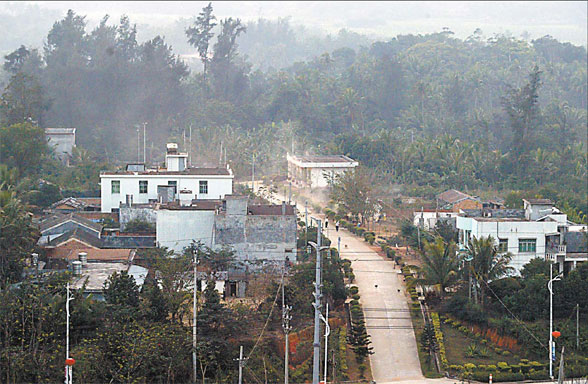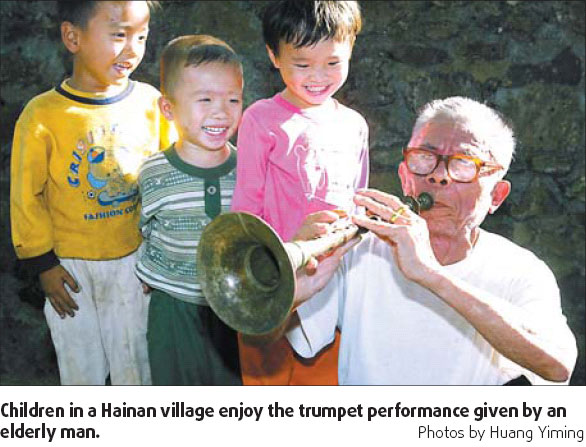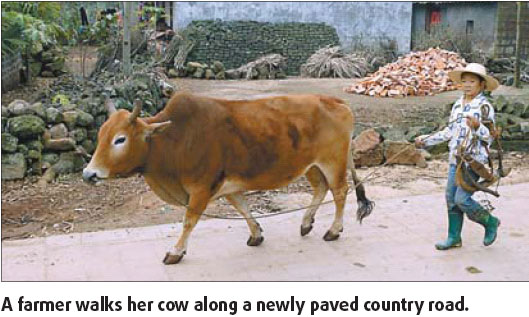Fields of green

Cai Fusheng, a 72-year-old lifelong farmer, remembers that in the days of arranged marriages in rural Hainan province's Yongtan village, a prospective suitor was evaluated by the number of buckets outside his family's house.
Because the volcanic bedrock in his hometown is particularly porous, water could only be found at the inaccessible depth of more than 200 m underground, so villagers had to collect rainwater in buckets.
However, when the ancient agrarian village of 847 people became an "ecological civilization village" in 1996, the experimental rural reform program quenched residents' thirst for both water and development.
The designation brought with it subsidies for the construction of a well, the paving of the roads - both to and throughout the village - and education for farmers about the latest innovations in agriculture and environmental protection.
But most importantly to farmer Wang Wenjin, his income increased 100-fold last year to 60,000 yuan ($8,571). Wang traded in his traditional crops of sugarcane and mushu (cassava) for more profitable harvests of olives at the advice of agricultural experts the government sent to the village through the program, he says.
Party secretary of Zuntan township Cai Weiping says the average income of the village's 200 households has increased 10-fold since the villagers started planting more profitable vegetables.
However, he says, the benefits extend beyond increased incomes.
"Becoming an eco-village has had a very strong impact on life here and especially on people's mindsets," Cai says.
"The farmers have been educated to protect their historical relics and grow ecologically friendly crops, such as beetle nuts.
"And the farmers have also learned not to cut down the trees," he adds, waving his hand towards a thicket flanking Wang's olive orchard.
Cai explains that villagers' growing environmental awareness has translated into growing prosperity.

"The quality of their vegetables is really good because of the ecologically friendly way in which they are produced, so they sell pretty well in the cities," he says.
And traveling to the city is now easier than ever before.
"Because of the paved roads, we can now travel to the city; I go there to find plants to process the olives," Wang Wenjin says. "The new roads have also enhanced us farmers' communication with the outside world."
Wang adds that the roads have also led villagers to a new world of modern farming equipment.
"It's much more convenient to use modern machines, especially to harvest olives. Before, we just couldn't do it, because the conditions in our village were so poor."
Yongtan was among the first settlements to become part of the experimental provincial eco-village program. But today, the program is vying for national recognition as a model, or "brand", of the "new socialist countryside" - the latest incarnation of the central government's rural reform campaign from 2005. The campaign aims to improve farmers' standard of living through the paving of roads, construction of reading rooms stocked with innovation-oriented materials about the main local industries, development of infrastructure for alternative energy and launch of site-specific projects.
Huang Xiaozhen, who lives in the fishing village of Lingshi, which became an eco-village in 2006, says the paving of roads and areas in front of residents' homes have created a collective psychological shift.
"Before, it was dusty and muddy, and people didn't care. But now, we care about hygiene," he says.
The government provided 220,000 yuan for "ecological civilization" projects for Lingshi's 526 residents, including 10,000 yuan of the 150,000 yuan needed to pave the roads.
Huang is happy with the improvements in sanitation in Lingshi, but he's even happier that his annual income increased by 1,000 yuan last year.
He says he owes the increase to the government purchases of new and larger boats for the villagers, who had been using small, rickety vessels.
"Now, my income is sufficient to live a good life," says Huang, who sells snails to fishermen.
The government also fully funded a new reading room, which the villagers constructed. Its shelves are stocked with materials about the latest innovations in fishing and aquaculture.
Huang also says the villagers have become increasingly aware of the outside world since the room was built.
It is powered by a wind turbine donated by a villager who left Lingshi to become a businessman and wanted to set a good example for his hometown.
But most alternative energy in Hainan's eco-villages comes from methane processed from pig manure. In places such as Jiaotang village, which centralized its 1,700 pigs in 2006, the move not only developed its "circular economy" but also improved hygiene.
Pig farming is also the largest industry in the village of Jiatong, after rubber harvesting, bringing in a total of 26 million yuan annually. Since the settlement of 675 people became an eco-village in 2002, it began supplementing its energy supply with methane from pig manure.
But rather than centralizing livestock, the government instead improved existing sties.

"Before we got standard pigsties in the village, the pens would lower hygiene levels," says pig farmer Wang Yinjiao. "But since we became an eco-village, sanitation and environmental conditions improved."
The government fully subsidized the cement for methane pools, which the villagers built themselves.
"Only a few households have begun using methane, but the village committee is planning to advance the project so all households have it," township director Wang Shixing says, adding that villagers still mostly use wood for heating and cooking.
The county agricultural institute also introduced genetically superior breeds of pigs and rubber trees, which villagers say dramatically boosted their incomes.
"With the additional money, we can further develop our businesses," Wang Yinjiao says. "And after developing our local economy, we'll become more prosperous and be able to create a more ecologically friendly and civilized society; and we can afford better education for our children."
The farmers say they are proud to have eight students from their village attending the prestigious Tsinghua University.
"And with better education, the children will bring more civilized thinking and advanced innovations back to our village, furthering our economic development and improving our all-around awareness," Wang Yinjiao says.
(China Daily 04/10/2008 page17)














